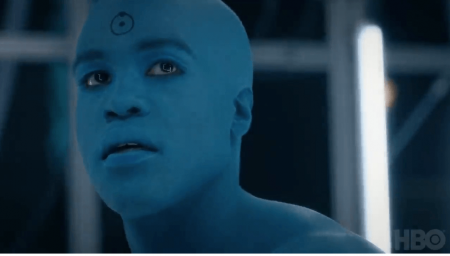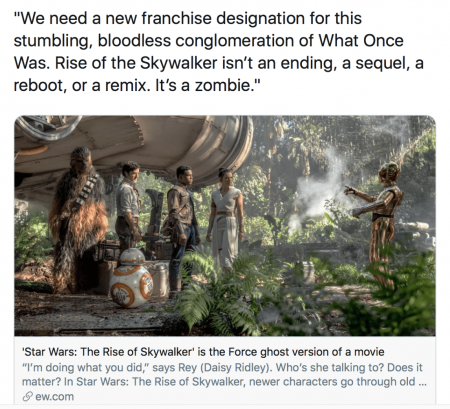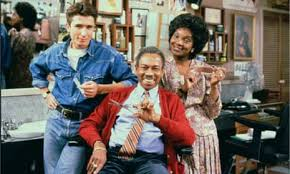William Proctor:
Lindelof has been quite insistent that he won’t return for a second season, but he is quite happy for the show to continue in his absence. His claim that the first season is complete in-and-of itself, however, isn’t quite true (at least in my reading). Angela Abar might now possess Dr Manhattan’s powers, but the episode cuts off before we learn whether or not she can walk on water after eating an egg that may or may not contain his super-juice—which I found laughable, to say the least. It’s much like the ending of Nolan’s Inception with the spinning top—just as we don’t know if Cobb is trapped in the dream-world or safely back in reality, we don’t know if Abar is the new Dr Manhattan (although I think we can say that she is, otherwise what would be the point?).
 I do think, however, there are enough positives to take from the series that a follow-up could be justified (which is not to say that it would be necessary). I’m not sure where it could go, but there aren’t that many superheroes in season one, so maybe we could have an array of new characters that don’t wholly rely on the past (although I wouldn’t be unhappy with the return of Nite Owl, or a Nite Owl 3.0). Having a black woman as the new Dr Manhattan might well be ideologically progressive, and very welcome, but I’m not sure how well it would work in story terms without treading water (although I’m not that kind of writer, to be truthful). Perhaps Watchmen should proceed by looking forward instead of looking back. The fact that masked vigilantes remain officially illegal in the Watchmen universe, except when used by the government, it may be interesting to see an emergence of new heroes that operate regardless of the law. It’s very early on in the comic that one of the detectives investigating Edward ‘The Comedian’ Blake’s death explains that ‘only the government-sponsored weirdos are active’, after masked vigilantes were outlawed in 1977. This is carried into the HBO series where Sister Night and Looking Glass work for the police. I don’t see why we shouldn’t see new heroes rise to challenge that status quo. Perhaps there will be a need for them to so, as usual.
I do think, however, there are enough positives to take from the series that a follow-up could be justified (which is not to say that it would be necessary). I’m not sure where it could go, but there aren’t that many superheroes in season one, so maybe we could have an array of new characters that don’t wholly rely on the past (although I wouldn’t be unhappy with the return of Nite Owl, or a Nite Owl 3.0). Having a black woman as the new Dr Manhattan might well be ideologically progressive, and very welcome, but I’m not sure how well it would work in story terms without treading water (although I’m not that kind of writer, to be truthful). Perhaps Watchmen should proceed by looking forward instead of looking back. The fact that masked vigilantes remain officially illegal in the Watchmen universe, except when used by the government, it may be interesting to see an emergence of new heroes that operate regardless of the law. It’s very early on in the comic that one of the detectives investigating Edward ‘The Comedian’ Blake’s death explains that ‘only the government-sponsored weirdos are active’, after masked vigilantes were outlawed in 1977. This is carried into the HBO series where Sister Night and Looking Glass work for the police. I don’t see why we shouldn’t see new heroes rise to challenge that status quo. Perhaps there will be a need for them to so, as usual.
 What do you think? Where do you think it could potentially go if another season ends up being green-lit? (And I do think it’s only a matter of time before it’s announced.)
What do you think? Where do you think it could potentially go if another season ends up being green-lit? (And I do think it’s only a matter of time before it’s announced.)
Will Brooker:
In the 2013 introduction to the Deluxe Edition of Watchmen, Gibbons says ‘Watchmen is finite, as closed and complete as a varnished oil painting or, perhaps, a delicate watch mechanism.’ Ironically, this was after the publication of Before Watchmen in 2012, so I’m not sure what he was thinking: he gave the prequels his blessing, which I believe led to a permanent rift with Alan Moore.
Overall, though I feel Snyder’s movie is deeply imperfect, I am happier with adaptations of the original graphic novel than I am with either sequels or prequels. I still think HBO’s Watchmen is an outstanding TV series, that its political approach was bold and significant, and that some episodes were incredible in their storytelling, but I wonder if it could have been achieved with new characters and situations, rather than as a ‘remix’ of Watchmen. The heart of the series was really the idea that the first ever superhero was Black, with origins in the Tulsa Massacre, and that decades later he helps his granddaughter, now a masked cop, to uncover a racist organisation, a new incarnation of the KKK. (By the way, the mesmerism technology didn’t go anywhere after the flashback episode, and I found Hooded Justice’s hypnotic flashlight a little hokey, too.) I’m not sure that Veidt-on-Europa, or the squid hoax, were really necessary to that central plot; there was certainly no need for the HBO series to be set in the same universe as Comedian, Rorschach or Nite Owl, as they were barely mentioned. The other cops, masked after the White Night, would still easily fit that revised concept, as would an FBI agent and former vigilante, like Laurie. True, without Dr Manhattan you would need another goal for all the ‘bad guys’ to be hunting, and you’d lose the unique love story between Jon and Angela, but it would surely be possible to substitute an analogue for Manhattan, the first metahuman; perhaps a Cold War weapon who’s officially disappeared from Earth and been missing for years. Like you, I’m not a screenwriter or showrunner so these are just ideas off the top of my head, but I think even those sketchy notions suggest that it could be done.
The advantage would be that Watchmen was left to stand alone, complete and finished, as its author always wanted — and as its artist says was the intention. I think it would be reasonable to try to respect Alan Moore’s clearly-stated views about what I think is one of his greatest works. In fact, it could be said that for Lindelof to tell a story using analogues would be closer to the spirit of Moore’s approach.
That said, I think Lindelof has certainly shown himself to be adept with the source material, and I would be interested in seeing him adapt the entire graphic novel from scratch as a twelve-episode series. If there are to be more spin-off TV shows, I’d rather see stories exploring the past — the 1990s of this universe, or the 1940s, or 1960s — rather than an attempt to continue directly from this season, which held nothing back and doesn’t seem to me as though it needs a follow-up.
Sure, it would be fun to see Looking Glass again, or a prequel about the crime-fighting adventures of Nite Owl and the Comedienne — I read that they stopped the Oklahoma City bombing in this timeline — but I think our cultural tendency to not leave things alone is unfortunate. ‘Nothing Ever Ends’, we’re told: that’s not always a good thing.
William Proctor:
‘Nothing Ever Ends’ could be the mantra for contemporary Hollywood, and by extension, other production cultures. I saw a tweet today that struck a chord—not about Watchmen, but about the just-released Star Wars: The Rise of Skywalker. (You and I have certainly spilled a lot of ink on Star Wars, and your work is what inspired me to become an academic in many ways, but that’s a conversation for another day!) The tweet contained a line that reminded me of your comments about Doomsday Clock as nothing but a ‘zombie’, and I couldn’t help but think of it as a general critique of franchised entertainment in the twenty-first century.
 It does seem as if popular culture is like a re-animated corpse nowadays, more fixated on ‘What Once Was’, than on what could be. I realize I run the risk of sounding like a disgruntled entertainment journalist, bleating on about the death of originality and Hollywood’s creative bankruptcy; yet while I’m fully aware that adaptations, remakes, sequels, spin-offs, etc. have significant cultural vintage, in some cases going back centuries, I do find myself exhausted at times with the endless repurposing of branded characters and properties. It’s not that the phenomenon is new, exactly—there were more remakes and adaptations during Hollywood’s classic period than there are today—but there does seem to be an over-reliance on reanimating old brands, especially if we consider what properties are being re-launched, retconned, rebooted and revived, in an endless cycle of death and resurrection, ad infinitum (and ad nauseum).
It does seem as if popular culture is like a re-animated corpse nowadays, more fixated on ‘What Once Was’, than on what could be. I realize I run the risk of sounding like a disgruntled entertainment journalist, bleating on about the death of originality and Hollywood’s creative bankruptcy; yet while I’m fully aware that adaptations, remakes, sequels, spin-offs, etc. have significant cultural vintage, in some cases going back centuries, I do find myself exhausted at times with the endless repurposing of branded characters and properties. It’s not that the phenomenon is new, exactly—there were more remakes and adaptations during Hollywood’s classic period than there are today—but there does seem to be an over-reliance on reanimating old brands, especially if we consider what properties are being re-launched, retconned, rebooted and revived, in an endless cycle of death and resurrection, ad infinitum (and ad nauseum).
I still enjoy being surprised by a ‘good’ resurrection, though: Blade Runner 2049 shattered my expectations by a long stretch, and I thoroughly enjoyed the Karate Kid re-launch, Cobra Kai. But I’m so exhausted by Marvel films, and superhero films in general. Once upon a time, we would have said that so much superhero content indicated a ‘cycle,’ but cycles are short bursts of cultural activity that end up fizzling out as audience interest moves onto something else. I don’t think we could describe almost two decades of superhero films and television series as a cycle. The genre has become far too embedded within the entertainment-industrial-complex to die on the vine (although I’m sure it’s time will come, just as it did for the Western).
Like you, I have been wondering if HBO’s Watchmen justifies using the title, or perhaps more pertinently, the brand. The name of the series is certainly important from a marketing, corporate perspective, acting as a brand marker that might stand out in a crowded transmedia marketplace. But it is of course entirely plausible that Lindelof could have made this story without Watchmen as a title. I like your idea of creating new superhero analogues in the spirit of Moore, but under a different name, yet I also understand why HBO—which is owned by Warner Bros. who also own DC Comics—would rather have as powerful a brand as possible to target audiences that already exist. (Production cultures don’t seem to have yet learned that this strategy also runs the risk of generating fan discontent and negative buzz well in advance of anyone seeing the finished product.) I guess that it seems too risky nowadays to trial something new without the support of a weighty brand signifier.
Watchmen is a special case, I’d argue. Your point about the comic being ‘finite’ and ‘complete’ is important. Unlike the usual ‘work-for-hire’ contracts with comic book publishers, where writers, artists etc. are paid laborers who generally do not retain ownership of what they create, Moore and Gibbons entered an agreement with DC where the rights would pass back to them once DC stopped publishing Watchmen. The fact that DC have not and have no intention of ceasing publication on perhaps their most successful ‘graphic novel’ suggests that Moore and Gibbons were conned, much like Joe Siegel and Jerry Shuster were with their Superman creation. I certainly believe that Watchmen has been diluted by spin-offs, although I have some respect for what Snyder achieved with his adaptation, especially the Ultimate Edition (which is over three-and-a-half hours long!). But that is part of being a fan: we fiercely protect our treasured objects from outside incursion, even as we are intimately aware that these are symbolic, psychic attacks. Yes, the comic book Watchmen still stands on my shelf, and yes, I can ignore the sequels, prequels etc. and embrace the comic as the ‘one text to rule them all’. Yet I can’t help but think that the comic has been symbolically assaulted in some way, and as a consequence, is no longer as unique as it once was. I feel the same about Star Wars: perhaps the franchise felt special because there were only six ‘Skywalker’ films produced over thirty years or so (compared to Disney releasing five Star Wars films in the last four years.)
A line from Stephen King’s Pet Sematary seems particularly fitting: ‘Sometimes, dead is better.’
Will Brooker is Professor of Film and Cultural Studies and Head of the Film and Television Department at Kingston University, London. Professor Brooker’s work primarily studies popular cinema within its cultural context, situating it historically and in relation to surrounding forms such as literature, comic books, video games, television and journalism. In addition to the numerous essays and articles on film and fan culture that he has published, his books include Why Bowie Matters (2019), Forever Stardust: David Bowie across the Universe (2017), Star Wars (2009), Alice’s adventures: Lewis Carroll in popular culture (2004), Using the Force: Creativity, Community and Star Wars Fans (2002), and the edited anthologies The Blade Runner Experience (2004) and The Audience Studies Reader (2003). He is also a leading academic expert on Batman and the author/editor of several books on the topic, including Batman Unmasked (2000) Hunting the Dark Knight (2012), Many More Lives of the Batman (2015).
William Proctor is Principal Lecture in Film and Transmedia at Bournemouth University. He is co-editor on the books, Global Convergence Cultures: Transmedia Earth (with Matthew Freeman, for Routledge 2018), and Disney’s Star Wars: Forces of Production, Promotion and Reception (with Richard McCulloch, for University of Iowa Press, 2019). William is a leading expert on reboots, and is currently writing a monograph on the topic for Palgrave titled Reboot Culture: Comics, Film, Transmedia. He has published on a wide-range of topics, including Star Wars, Batman, James Bond, Stephen King, and more.







![MERDE, DOUBLAGE INDISPONIBLE! [OMG IT’S NOT DUBBED] by John Ellis](https://cstonline.net/wp-content/themes/Extra/images/post-format-thumb-text.svg)